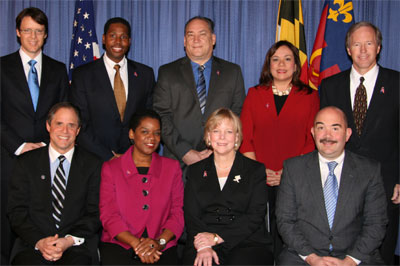
Council Sends Worker Protection Act To Leggett
The Montgomery County Council on September 18 approved Bill 19-12—known as the Displaced Service Worker Protection Act—that will ensure that vulnerable, low-wage service workers have temporary job protections when their employer’s service contract is terminated.
Councilmember Valerie Ervin was the chief sponsor of the bill, which also was supported by Council Vice President Nancy Navarro and Councilmembers Marc Elrich, Craig Rice and Hans Riemer in the 5-4 vote of approval. Councilmember President Roger Berliner and Councilmembers Phil Andrews, Nancy Floreen and George Leventhal voted against the bill.
County Executive Isiah Leggett has 10 days to sign the bill. It will become law 91 days after he signs it.
Currently, a new or successor contractor is not required to retain incumbent service workers and must quickly recruit new employees. This process often results in sudden unemployment for many existing low-wage service workers.
The goal of the bill is to provide notice to and a transition period of temporary employment for service workers who are subject to unemployment due to their employer’s loss of a service contract.
“Our home, the Metropolitan Washington Area, is among the most vibrant and successful regions in the nation; and it is our working class men and women who help make it so,” said Councilmember Ervin. “Many of these people are seldom seen. Whether they are janitors, nurses aides or security guards, they all work hard at tough jobs in a low-wage world.”
The bill requires a successor contractor to offer to retain the incumbent service workers for a temporary 90-day transition period. The goal of the bill is provide stability to service workers whose lives can be irreparably harmed by even short-term income interruptions. Bill 19-12 does not regulate wages or benefits.
“This bill is about providing fundamental fairness for some of the region’s lowest paid employees,” said Councilmember Ervin. “During this time of unprecedented fiscal stress, the bill represents what the District of Columbia and other communities have already experienced: a modest and workable way to make their lives more secure.”
Bill 19-12 provides for enforcement by the Office of Human Rights and the Human Rights Commission. It authorizes the Human Rights Commission to award certain relief.
“Bill 19-12 provides notice and more predictability for hard working low-wage earners,” said Council Vice President Navarro. “Although the bill does not guarantee a job, raise wages or provide additional benefits, it goes a long way in protecting hard working families.”
The bill would impact contracts involving security, janitorial, building maintenance, food preparation or non-professional health care service providers.
The bill would apply if the contract is in effect for workers at a private school; hospital, nursing care facility or other health care provider; institution such as a museum, convention center, arena, airport or music hall; multi-family residential building or complex with more than 30 units; or commercial building occupying more than 75,000 square feet.
According to a letter submitted to the Council by Building Service Management, Inc., which has accounts in Maryland and the District, “Displaced Worker legislation allows us to compete on the quality of our services without hurting employees—something all responsible contractors are pleased to do.”
“This bill provides workers with a modest degree of stability and time in which to either demonstrate their abilities to the new contracting company or seek other employment,” said Councilmember Elrich. “It provides modest protection for employees, while not requiring the employer to continue the terms of the old contract. This law has been in effect in Washington, D.C., for 18 years and neither side made an argument that the law had any negative effect on the office real estate market.”
Similar legislation has been a success in many states and localities across the country – including Washington, D.C., which has many of the same cleaning contractors as Maryland. San Francisco, New York City, Los Angeles and the state of California have also passed displaced worker laws.

Engage us on Facebook
Follow us on Twitter
Tweets by @mymcmedia